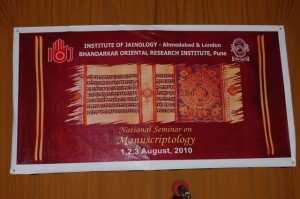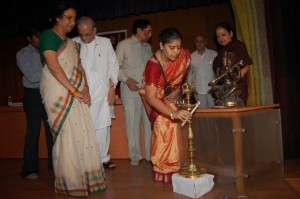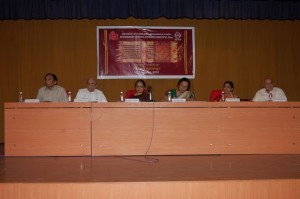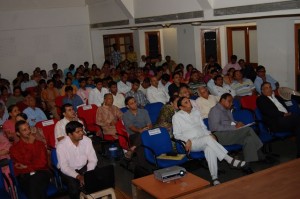
Institue of Jainology, London and Ahmedabad in conjunction with Bhandarkar Oriental Research Institue, Pune had organized a three day seminar on Manuscriptology from 1st to 3rd August at Vishwakosh Bhavan, Ahmedabad.
This was a first ever seminar organized in India on Manuscriptology attended by both professionals and students of the subject. Over 230 professionals and students attended the seminar.
Prof. Dipti Tripathi, Director of the National Mission for Manuscripts, New Delhi inaugurated the seminar with an opening addressed. She started by commending Mr Nemu Chandaria OBE and Padmashree Dr Kumarpal Desai to have conceived the idea of this seminar at a national level. It was sure to inspire more research work

She emphasized the need for research in manuscriptlogy as we need to understand the rich heritage from our ancestors.
She also expressed concern that there was very little research on ways of conserving the manuscripts. Modern technology has enabled many conservation methods but no research has been undertaken seriously.
Both the Government and the private institutes have funding available to offer financial assistance and scholarship but sadly the researchers have not come forward to take this opportunity.
She was of the opinion that such seminars would certainly help bring about a deeper understanding of the subject and inspire interest in studying the manuscripts and also undertake research on manuscript conservation.
She concluded with commending the Institute of Jainology once again for the initiative and assured it and other Institutes that if they had proper infrastructure to promote such activities, financial assistance will certainly be available from the Government. In her conclusion she also referred to the work done by the Institute in creating an excellent catalogue of the manuscripts held in the British Library collection and the JAINpedia project to make the rare manuscripts accessible to lay people.

The first session of the seminar was opened by Dr. Sudha Gopalakrishnan the former Director of the National Mission for Manuscripts. In her talk she suggested that manuscriptology as a subject should be included in the University curriculum and appealed to the professors present in the audience to take this message home.
In the sessions that followed, there were 24 prominent speakers from Departments of History, Languages, and Philosophy from various leading universities. All were very enthusiastic to have had an opportunity to attend such a seminar and expressed their agreement to increase the level of both the studies and research in the subject of manuscriptology.
Several Heads of various departments at universities and institutes agreed to make available to both students and research graduates the photocopies of the MSS for research in Jain Agam, Religion, Art, History, Civilization, Medicine, Sculpture and so on.
It was very pleasing to note that new subjects in Manuscriptology were introduced by three MSS experts in the field, namely Dr. Niranjan Rajyaguru, Dr. Balwant Jani, and Dr. Mohyuddin Bombaywala. The three new subjects were:
(1) Sant Sahitya: Manuscripts Research and Editing
(2) Charani Sahityani Hastaprato.
(3) Farasi Hastaprato: Sanshodhan and Sampadan

Dr. Kumarpal Desai and Shri Nemubhai Chandaria, Trustees of the Institute of Jainology announced the availability of a scholarship for post graduate research in MSS.
They also announced a competition to encourage the students attending the seminar to study and write on what had been discussed and proposed in the seminar.
The Institute can take justifiable pride in having not only pioneered fundamental research in the subject of Manuscriptology by having created the catalogue of British Library collection but also inspired further studies and research in to the rich heritage in India of the ancient manuscripts.

